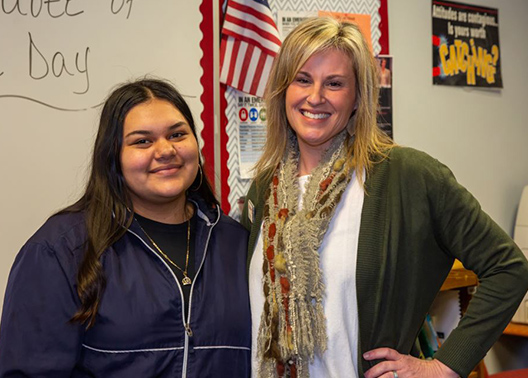Creating an Individualized Success Plan
October 7, 2020

Step into a classroom and you will see a lot of items designed to make students feel comfortable. Studies show that learning environment is critical to student success. In some cases, and for various reasons or circumstances, traditional high school does not always work. For those students, Tulsa Tech has a second chance called Career Academy.
“Coming here was different,” Chyna Mickle, a graduate of Career Academy said. “It is a different atmosphere. You don’t have all the demands and pressures from the outside.”
Career Academy is designed to help at-risk students get the education they need. Studies have shown dropouts earn over ten thousand dollars per year less than those with a high school diploma. Not only does the Career Academy provide an ideal environment for students to earn a diploma, they also train for various career opportunities that can lead to successful future outcomes.
The program is not open to every student. Those wanting to take part must apply and be accepted. While the course work is the same as any high school, former students like Mickle say it’s the instructors and staff that make the difference.
“The teachers, you can tell they’re here for you,” Mickle said. “The people will do everything in their power to help you. They will talk to you, listen to you and they make you feel like you are heard.”
For Mickle, the change had a dramatic impact on her life. A change that even caught the attention of a counselor.
“Seeing her walk into the classroom today compared to just a few months ago, it just reinforces why I do what I do,” Kori Moore, a Counselor at the Career Academy said with a tear. “She (pointing at Mickle) looks like a completely different person from the inside out.”
The program is about more than just academics. Over the last five years, the academy has had an annual enrollment of nearly 60 students, with an attendance rate near 90 percent. Building upon the foundations of responsible decision-making, self-awareness and relationship skills also helps to develop better social and emotional skills, leading to successful outcomes for all students.
“Because of the Career Academy, I feel my relationship with my mom and myself has gotten better,” Mickle said with a smile. “Coming here, I became mentally stronger and learned how to better resolve problems.”
One way the academy works to cut through barriers one might find in a typical high school is with daily group lunches. The bonding experience, as Mickle called it, was one of the biggest differences she saw from her home high school.
“I liked lunch together because when you are in a high school everybody is divided into their own groups,” Mickle commented. “Here we all came together and that would not normally happen.”
Ultimately success in the program is up to each student. Mickle knew that this was her chance and she wasn’t going to throw away her shot at success.
“Without this program, I wouldn’t be where I am today,” Mickle chimed in. “I may not have graduated from high school.”
“It’s about choices,” Moore said. “Whether it’s college or career we help students make a plan and find the plan that best fits their needs.”
An added bonus upon completion of the program is that graduates walk across the stage along with all of their classmates during their home high school commencement ceremony.